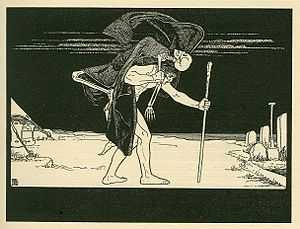Dybbuk

In Jewish mythology, a dybbuk (Yiddish: דיבוק, from Hebrew adhere or cling[1]) is a malicious possessing spirit believed to be the dislocated soul of a dead person.[2][3] It supposedly leaves the host body once it has accomplished its goal, sometimes after being helped.[3]
Etymology
"Dybbuk" is an abbreviation of dibbuk me-ru'aḥ ra'ah ("a cleavage of an evil spirit"), or dibbuk min ha-hiẓonim ("dibbuk from the outside"), which is found in man. "Dybbuk" comes from the Hebrew word "דיבוק," which means the act of sticking from the root "דבק," which means cleave.
History
The term first appears in a number of sixteenth-century writings,[1][4] though it was ignored by mainstream scholarship until Ansky's play The Dybbuk popularized the concept in literary circles.[4] Earlier accounts of possession (such as that given by Josephus) were of demonic possession rather than that by ghosts.[5] These accounts advocated orthodoxy among the populace[1] as a preventative measure. For example, it was suggested that a sloppily made mezuzah or entertaining doubt about Moses' crossing of the Red sea opened one's household to dybbuk possession. Very precise details of names and locations have been included in accounts of dybbuk possession. Yoel Teitelbaum, the Satmar rebbe (1887–1979) advocated psychiatry as a cure.[5]
There are other forms of soul transmigration in Jewish mythology. In contrast to the dybbuk, the Ibbur (meaning "impregnation") is a positive possession, which happens when a righteous soul temporarily possesses a body. This is always done with consent, so that the soul can perform a mitzvah. The gilgul (Hebrew: גלגול הנשמות, literally "rolling") puts forth the idea that a soul must live through many lives before it gains the wisdom to rejoin with God.
In popular culture
The Dybbuk has been portrayed in popular culture in theatrical releases like the films A Serious Man (2009), The Unborn (2009) and The Possession (2012).
The Dybbuk appears in written fiction in The Inquisitor's Apprentice (2011), a novel by Chris Moriarty.
In the comic series Girl Genius, the forcible insertion of the mind of Agatha's mother, the main villain Lucrezia Mongfish/"The Other", into her own was compared to a Dybbuk by one of her followers when reporting the situation to someone else.
See also
Further reading
- J.H. Chajes, Between Worlds: Dybbuks, Exorcists, and Early Modern Judaism, University of Pennsylvania Press, Aug 31, 2011.
- Rachel Elior, Dybbuks and Jewish Women in Social History, Mysticism and Folklore, Urim Publications, 1 Sep 2008.
- Fernando Peñalosa, The Dybbuk: Text, Subtext, and Context. Jan 2013.
- Fernando Peñalosa. Parodies of An-sky’s The Dybbuk. Nov 2012
References
- ↑ 1.0 1.1 1.2 A Psychoanalytic History of the Jews, by Avner Falk, p.538, Fairleigh Dickinson Univ Press, 1996
- ↑ "Dybbuk", Encyclopædia Britannica Online, retrieved 2009-06-10
- ↑ 3.0 3.1 "Dibbuk", Encyclopedia Judaica, by Gershom Scholem.
- ↑ 4.0 4.1 Spirit Possession in Judaism: Cases and Contexts from the Middle Ages to the Present, by Matt Goldish, p.41, Wayne State University Press, 2003
- ↑ 5.0 5.1 Tree of Souls:The Mythology of Judaism, by Howard Schwartz, pp. 229–230, Oxford University Press, 1 Nov 2004
External links
- "The Dybbuk" by Ansky Jewish Heritage Online Magazine
- Spiritual Possession and Jewish Folklore
- Encyclopedia Britannica